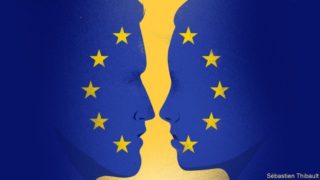Can it weather the storm?
INTERNAL FRICTIONS, external worries and some long-anticipated farewells will be the order of the day for the European Union in 2021. A colossal amount of effort went into agreeing to issue €750bn ($888bn) in collective debt for the first time to allay a financial crisis, as covid-19 racked the continent. In 2021 EU politicians will learn that agreeing to borrow the money was the easy bit—agreeing how to spend it will be much harder.
Sceptical countries, such as the Netherlands, will keep a close eye on what governments are doing with the money; Spanish and Italian politicians will not appreciate other EU countries butting into their financial affairs. They will have to get used to it, though. Such debates are normally the purview of purely national politics. In 2021 they will start to take place on a European level.
Mark Rutte, the Dutch prime minister, will have little incentive to go easy on his southern neighbours. The Netherlands will go to the polls in the spring—the first of two important European elections in 2021—and Mr Rutte will pick a fight with southern governments so as not to lose voters to his Eurosceptic right. Yet the liberal-conservative Dutch prime minister will have to walk a tightrope: Europhilic parties lurk to his left. Mr Rutte has found a cunning way to balance these two camps. Expect him to join liberal rivals in staunch criticism of Poland and Hungary for backsliding on democratic norms. For the Dutch, a press-nobbling Hungarian is just as bad as a profligate Italian.
Doubts over the rule of law will dog the union in 2021. This will get worse as countries such as Bulgaria, Cyprus and Malta—where allegations of corruption, passport-hawking and press suppression are rife—join Poland and Hungary on the EU’s naughty step. The single market rests upon the assumption that each country has incorruptible politicians, a free press and a fair legal system, which is not something that can be guaranteed. Patience will be in short supply.
So will action. Viktor Orban, Hungary’s prime minister, has run rings round his liberal opponents for more than a decade, protected in part by his membership of the European People’s Party, the influential centre-right group of European politicians. Invertebrate politicians from the centre-right have done little to restrain him. Mr Orban’s run of victories will not be brought to a halt, even as his fellow leaders grumble.
Depressingly, many leaders ignore the topic because they believe the EU has bigger problems. When it comes to foreign policy, they are right. A ring of instability surrounds the bloc, from north Africa to Russia. Vladimir Putin and Recep Tayyip Erdogan will menace the union’s frontiers, while the EU flails in its response. Coming up with a coherent foreign policy towards the EU’s neighbours will be a nightmare. Interests diverge too sharply over countries such as Russia and Turkey, which manage to be useful friends for some member states and existential threats to others.
The EU will be more united on matters farther afield. It is easier, but still not easy, to devise a common policy towards China than it is on Russia. The arrival of Donald Trump in the White House was a timely reminder that American and European interests do not always align. European powers (egged on in particular by Emmanuel Macron, the French president) have learnt, belatedly, that sometimes the union must go it alone. European sovereignty—the ability not to be bossed around by a hegemon—will be the watchword. President Joe Biden will do little to stop this inexorable shift. Ursula von der Leyen, the newish president of the European Commission, has said she will run a “geopolitical commission”. It is in the EU’s relations with other great powers that this idea will be forged. The EU will remain wary of over-reliance on America. It is determined not to be sucked into any great-power struggle between China and America. Although the EU has long held its own as an economic power, using trade as a stick, serious attention will turn to its (lack of) military capability in 2021. After all, Britain, the main—but by no means the only—obstacle to such an approach, is gone.
In 2021 Brexit begins in earnest. After four years of argument, its effects will start to be felt. Business people have long been aware that their lives will change, but British citizens will receive a ruder awakening. Attention will be grabbed by seemingly trivial consequences. Rows over such issues as pet passports—and the potential spectacle of French border guards impounding British dogs—rather than more substantial economic issues will play an improbably large role in the debate. Brexiteers have long made the mistake of assuming that the EU is puny. Remainers, meanwhile, assume that it is kind. Both are in for a shock.
Other departures will leave more of a hole. Angela Merkel will exit the European stage when she leaves office after the German election in the autumn. Mrs Merkel has been the Copernican constant of the EU system: politics moved around her. Although Germany did not always get what it wanted, it was nearly always able to stop what it opposed. Her departure will leave a vacuum. Who will fill it? For Europe, that will be the most consequential outcome of 2021.
This article by Duncan Robinson: Brussels bureau chief and Charlemagne columnist, The Economist, was first published on the 17th of December on the World Ahead section of The Economist.




